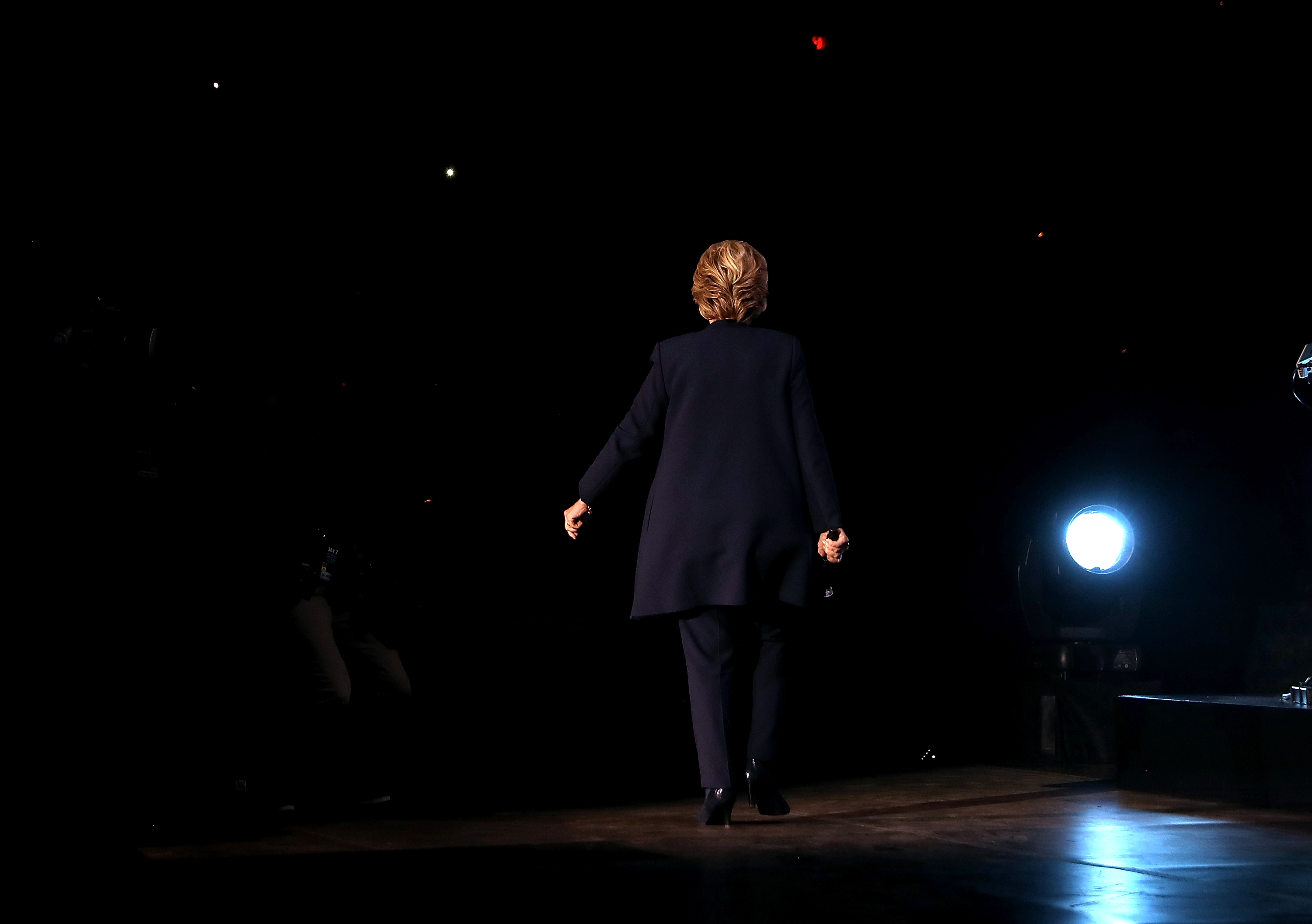What Hillary's astounding loss means for the Democratic Party
The New Democrats now face their own political reckoning


In 1972, an insurgent faction of left-wing radicals seized the Democratic Party presidential nomination, doggedly defeating a slew of other candidates with tremendous effort, and put up George McGovern as the nominee. He proceeded to get absolutely flattened in the general election, losing by 23 percentage points and 503 electoral votes.
It was one of the all-time blowouts in American history, and it cemented a certain narrative in the minds of the younger Democratic politicos: The New Deal was dead, dead, dead. McGovern's loss, and the economic chaos which followed in the mid-'70s, convinced rising Democratic elites that old-fashioned pro-union labor liberalism was discredited, and Democrats needed to embrace neoliberal ideas coming out of Midwestern economics departments and the center-left opinion journals like The New Republic.
As Matthew Stoller writes, a new generation of liberals, centered around a man named Al From and his organization the Democratic Leadership Council, and calling themselves the New Democrats, mobilized to make their ideology the dominant one in the Democratic Party. As more-or-less traditional Dems lost in 1980, 1984, and 1988, and the older New Dealers aged and retired, their argument gained credibility. By 1992, they were the party's center of gravity, and one of their own was elected to the presidency. Unions fell into secular decline, manufacturing jobs were annihilated by trade agreements, anti-trust enforcement was all but halted, welfare for the very poor was gored, and finance was deregulated — not entirely the New Democratic platform, but the general thrust of it.
The Week
Escape your echo chamber. Get the facts behind the news, plus analysis from multiple perspectives.

Sign up for The Week's Free Newsletters
From our morning news briefing to a weekly Good News Newsletter, get the best of The Week delivered directly to your inbox.
From our morning news briefing to a weekly Good News Newsletter, get the best of The Week delivered directly to your inbox.
The New Democrats now face their own political reckoning. President Obama was heavily influenced by them, but the latest heir to their ideological tradition — Hillary Clinton — just bungled what seemed like an easy lay-up of an election, in part because she lost voters who were badly harmed by the slate of New Dem policy. This is their McGovern moment. The Democrats have done everything according to their playbook, and the party is now in its worst political position since before the Great Depression. This is the first time since 1928 that Republicans will hold the House, Senate, the presidency, the Supreme Court, and most state legislatures and governorships.
A change is needed. It might as well be in the direction of social democracy.
At this early stage, we can't know with certainty exactly why Clinton lost. In a narrow sense, obviously, the electoral vote was lost because she lost Wisconsin, Pennsylvania, Michigan, and Iowa. Exit polls (which are often unreliable, but all we have for the moment) and the vote distribution strongly suggest those states were lost because Clinton lost many of the white working-class voters that broke for Obama in 2012. Overall exits show a 16-point swing to Trump among voters making less than $30,000 compared to the last presidential election — the biggest of any group in The New York Times crosstabs. (Recall that Obama ran hard on his rescue of General Motors against a brutal venture capitalist.) Also, general turnout was off from 2012.
These key Trump voters are, no doubt, either actively racist or fine with electing an obvious racist and admitted sexual predator. But many of their communities have also been badly harmed by offshoring, the failure to fully fix the damage done by the 2008 recession, the hugely Democrat-enabled foreclosure crisis, financialization, the rise of monopolies, and the general rise in inequality.
A free daily email with the biggest news stories of the day – and the best features from TheWeek.com
But what is known for certain is that she did lose, and it seems highly plausible that somebody else could have won. Her approval rating has been underwater since early 2015, and stuck around 40 percent for most of this year. Her primary opponent Bernie Sanders, by contrast, is now the most popular politician in the country. His numbers surely wouldn't be quite so good if he had been nominated, of course, but it's highly unusual for a defeated primary candidate to soar to enormous popularity. What's more, President Obama's rating is also well north of 50 percent. It sure looks for all the world like Clinton is just unusually unpopular.
At any rate, the most important fact for the future of the Democratic Party is how Clinton's loss blows up the logic of the New Democrats and the implicit bargain they have struck with the values of left politics. The Democrats, at least if you believe their fire-breathing media sycophants, are the party of social justice, economic redistribution, good government programs, environmental preservation, helping the poor, and so forth. Along any reasonable measurement of these values, Sanders was by far the better choice during the primary. His platform and record were better on race, better on gender, better on LGBT rights, better on health care, better on climate change, and better on economics.
The trump card (pun intended) that Team Clinton played, over and over again, was electability. Sanders, they said, was too great a risk. Socialism doesn't play well in American politics, they argued. But now, incredibly, Clinton has blown it. The most milquetoast, careerist, cautious, well-known, and well-connected person in the entire party could not beat literally the most unqualified opponent in American history. It was not a 1972-sized blowout, but the strategic damage to the party's priorities will be far worse.
It could be that Sanders would have lost as well. But New Democrat neoliberalism manifestly does not any longer deliver the electoral goods that were its original reason for existence. Going forward, Democrats might as well shoot the moon with aggressive Sanders-style social democracy. There is, almost literally, nothing left to lose.
Ryan Cooper is a national correspondent at TheWeek.com. His work has appeared in the Washington Monthly, The New Republic, and the Washington Post.
-
 Ultimate pasta alla Norma
Ultimate pasta alla NormaThe Week Recommends White miso and eggplant enrich the flavour of this classic pasta dish
-
 Death in Minneapolis: a shooting dividing the US
Death in Minneapolis: a shooting dividing the USIn the Spotlight Federal response to Renee Good’s shooting suggest priority is ‘vilifying Trump’s perceived enemies rather than informing the public’
-
 5 hilariously chilling cartoons about Trump’s plan to invade Greenland
5 hilariously chilling cartoons about Trump’s plan to invade GreenlandCartoons Artists take on misdirection, the need for Greenland, and more
-
 The billionaires’ wealth tax: a catastrophe for California?
The billionaires’ wealth tax: a catastrophe for California?Talking Point Peter Thiel and Larry Page preparing to change state residency
-
 Bari Weiss’ ‘60 Minutes’ scandal is about more than one report
Bari Weiss’ ‘60 Minutes’ scandal is about more than one reportIN THE SPOTLIGHT By blocking an approved segment on a controversial prison holding US deportees in El Salvador, the editor-in-chief of CBS News has become the main story
-
 Has Zohran Mamdani shown the Democrats how to win again?
Has Zohran Mamdani shown the Democrats how to win again?Today’s Big Question New York City mayoral election touted as victory for left-wing populists but moderate centrist wins elsewhere present more complex path for Democratic Party
-
 Millions turn out for anti-Trump ‘No Kings’ rallies
Millions turn out for anti-Trump ‘No Kings’ ralliesSpeed Read An estimated 7 million people participated, 2 million more than at the first ‘No Kings’ protest in June
-
 Ghislaine Maxwell: angling for a Trump pardon
Ghislaine Maxwell: angling for a Trump pardonTalking Point Convicted sex trafficker's testimony could shed new light on president's links to Jeffrey Epstein
-
 The last words and final moments of 40 presidents
The last words and final moments of 40 presidentsThe Explainer Some are eloquent quotes worthy of the holders of the highest office in the nation, and others... aren't
-
 The JFK files: the truth at last?
The JFK files: the truth at last?In The Spotlight More than 64,000 previously classified documents relating the 1963 assassination of John F. Kennedy have been released by the Trump administration
-
 'Seriously, not literally': how should the world take Donald Trump?
'Seriously, not literally': how should the world take Donald Trump?Today's big question White House rhetoric and reality look likely to become increasingly blurred
